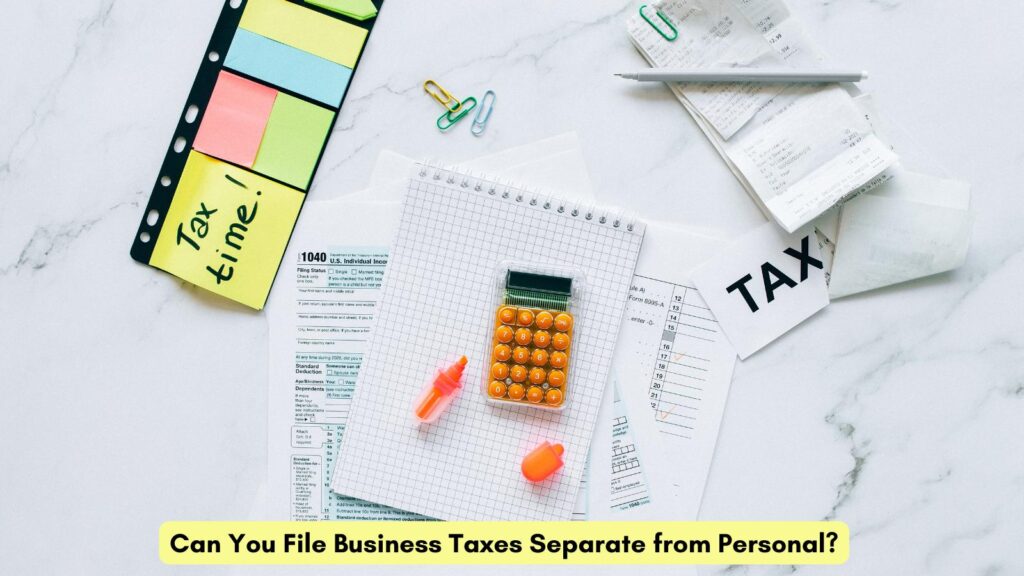Are you a small business owner wondering, “Can you file business taxes separate from personal taxes? ” You’re not alone today. Many entrepreneurs struggle with this question as tax season rolls around.
The simple answer is—yes, you can. Separating your business and personal taxes makes life easier come tax time and provides more precise insights into your business’s financial health.
Understanding this distinction can save you time, reduce stress, and help you avoid common tax pitfalls.
Please read this post to explore how separating these taxes affects your business and why it’s essential for long-term success.
Table of Contents
Understanding Business Structures
When you’re trying to figure out if you can file business taxes separately from personal ones, understanding the type of business structure you operate is key. Each structure affects how you file your taxes, and knowing the differences will help you make informed decisions.
Let’s examine four common business types: sole proprietorships, partnerships, corporations, and Limited Liability Companies (LLCs).
Sole Proprietorships
In a sole proprietorship, you’re the boss, and the business is all rolled into one. Your personal and business income mix together like ingredients in a smoothie. For tax purposes, you report all income and expenses on your tax return using Schedule C.
It’s as if the business doesn’t have its own identity; it’s an extension of you. This simplicity is great for ease, but it also means that your personal and business finances are firmly linked.
When tax time rolls around, it’s all about blending your worlds into a single return.
Partnerships
Now, let’s talk about partnerships. Think of it as a group project, where everyone shares the workload and the grades. Partnerships file an informational return using Form 1065, showing how the business performed.
What’s different here is that the partnership doesn’t pay income tax. Instead, each partner gets a slice of the business income or loss, which they report on their tax returns through Schedule K-1.
It’s like passing out cake slices; everyone takes their piece home.
Corporations
When it comes to corporations, they’re like entirely separate people in the eyes of the law and the IRS. They file their tax returns with Form 1120 and are taxed on their profits, distinct from the shareholders’ taxes.
This separation can be beneficial. For instance, it can offer liability protection, keeping your assets safer from business-related debts or lawsuits. Plus, there’s the potential for corporate tax rates, which might be lower than personal income tax rates, depending on the situation.
This separation acts like a sturdy fence between your personal and business finances. My husband’s trucking business has this business entity.
Limited Liability Companies (LLCs)
LLCs, limited liability company llcs on the other hand, are known for their flexibility. They’re a bit like chameleons, with the option to choose how they’re taxed. This is the business structure for my business, Inspire To Thrive.
As an LLC owner, you can decide if you’d rather be taxed as a sole proprietorship, partnership, S corporation, or even a C corporation.
This choice can allow an LLC and personal taxes to be filed separately, depending on the tax treatment you select. It’s like choosing your adventure book—each path has its own set of outcomes and implications for filing your taxes.
I’ve also chosen to do mine together, with the advice of our accountant.
This flexibility helps suit what best fits your business goals and personal financial strategy. By sorting through these structures, you can better understand how your business should handle taxes.
Whether you combine it all or keep things separate, understanding your business structure is the first step in answering the question, ” Can you file business taxes separately from personal?”
Tax Filing Requirements for Small Businesses To Decide “Can You File Business Taxes Separate From Personal Taxes?”
When running a small business, sorting out your taxes might feel like solving a giant jigsaw puzzle. You might wonder, “Can you file business taxes separately from personal?”
You can, but knowing how this works will save you time and headaches. Let’s break down what you need to know to keep Uncle Sam happy and ensure your business ticks smoothly.

Estimated Tax Payments
As a small business owner, paying estimated taxes is crucial. Unlike personal taxes, where deductions are usually made directly from your paycheck, business income often requires you to set aside those payments.
Estimated tax payments ensure you don’t have a massive bill at the end of the year.
- Personal vs. Business: For personal income, taxes are typically deducted from your salary by your employer. But with business income, especially if you’re self-employed, you’re responsible for estimating and paying these taxes every quarter. This applies if you expect to owe $1,000 or more in taxes when your return is filed.
- The IRS has specific deadlines each year:
- April 15, June 15, September 15, and January 15 of the following year
- Yep, if you exceed your estimates, you are punished. I’ve been there and had it happen last year. I had to pay a big fine.
Deductions and Credits
One of the biggest advantages of filing business taxes is the range of deductions and credits available that are not usually applicable to personal taxes.
These deductions can significantly lower your taxable income and, consequently, your tax bill.
- Business Expenses:
- Office Supplies: Pencils, papers, and even your laptop.
- Travel Costs: Flights and hotels for business trips.
- Meals: Business lunches can be a write-off.
- Home Office Deduction: If you’re using part of your home exclusively for business, you might qualify for a home office deduction. This can include a portion of your mortgage or rent, utilities, and insurance.
- Employee Costs: Your employees’ salaries, insurance benefits, and retirement contributions can reduce your tax burden.
- Tax Credits: Often more valuable than deductions:
- Research and Development (R&D) Credits: For businesses investing in innovation.
- Energy Efficiency Credits: For businesses using renewable energy.
These credits and deductions are like hidden money—they can make a significant difference when filing business taxes separately from personal taxes.
Staying informed and organized with estimated tax payments and taking full advantage of available deductions and credits can help you manage your business finances effectively.
I use an Excel spreadsheet and update it as I make purchases. I have a monthly section and a yearly one to better prepare now.
Rather than stumbling through tax season, you’ll feel more prepared and confident, paving the way for growth and stability in your small business.
Can You File Business Taxes Separate from Personal?
Understanding how to handle your business taxes can feel like navigating a maze. Many small business owners wonder, “Can you file business taxes separate from personal taxes?”
The answer is yes, but it’s important to know the ropes to avoid any problems. Let’s break down the key requirements and consequences related to filing business taxes separately.
Can You File Business Taxes Separate from Personal? Requirements for Separate Filing
To file your business taxes separately from your personal taxes, first, you need to determine the structure of your business. Here are some specifics:
- Type of Business Entity: If your business is structured as a corporation (either a C corporation or an S corporation), it’s required to file separately. Corporations are seen as independent legal entities, so they handle their own tax return.
- Limited Liability Companies (LLCs): LLCs offer flexibility. They can be taxed as a sole proprietorship, partnership, or corporation. If your LLC opts for corporate tax treatment, it must file separately.
- Registered Employer Identification Number (EIN): Ensure your business has an EIN. This differs from your Social Security Number and is used for business taxes.
So, if you’re a sole proprietor, your business income is typically filed with your tax return using Schedule C. But, if you’re operating as one of the structures mentioned, you’re in the clear to file separately.
Can You File Business Taxes Separate from Personal? Consequences of Not Separating Taxes
Failing to file your business taxes separately when required can lead to a heap of trouble. Here’s what might happen:
- Legal Penalties: The IRS doesn’t take kindly to incorrect filing. Inaccurate tax submissions can lead to penalties or even audits. Think of it like crossing a red light; the repercussions might catch up with you when you least expect it.
- Financial Repercussions: Improperly combining taxes could mean missing out on business deductions, leading to a higher tax bill. Plus, interest may accumulate on unpaid taxes if you mix personal and corporate finances.
- Credibility Hit: Separating business and personal taxes underlines professionalism. Blurring these lines can hurt your business’s credibility with the IRS and potential investors.
To sum up, keeping your business and personal taxes separate isn’t just about following the rules—it’s about safeguarding your business’s future.
Best Practices for Small Business Owners
As a small business owner, handling your taxes can sometimes feel like walking through a maze. It’s crucial to navigate this maze with ease and confidence.
One common question is, “Can you file business taxes separately from personal?” The answer can be yes or no, depending on your business structure, but how you manage your tax responsibilities matters.
To help, let’s explore some best practices for making your tax filing process smoother and more efficient.
Keeping Accurate Records To File Business Taxes Separately
Imagine trying to piece together a puzzle without all the pieces. That’s what it’s like if you don’t keep accurate records of your business expenses.

It’s not just about avoiding mistakes; it’s about clearly understanding your financial situation. When you mix personal and business expenses, your financial situation becomes a tangled mess that’s hard to untangle.
Here’s what you can do:
- Use separate bank accounts: This helps you see clearly where your money is going and coming from. Have a business banking account along with a personal account.
- Keep all receipts: Save those receipts, whether it’s a coffee meeting or a major equipment purchase. They’re vital for tracking expenses.
- Utilize accounting software: Tools like QuickBooks or FreshBooks can automate record-keeping and make your life easier.
By keeping distinct records, you prepare for tax time and set yourself up for success throughout the year in filing your LLC and personal taxes.
Can You File Business Taxes Separate from Personal? Consulting with a Tax Professional
When it comes to taxes, you don’t have to go it alone. Consulting with a tax professional can be like having a guide while hiking a difficult trail.
They know the landscape, the pitfalls, and the shortcuts that can save you time and money. They can help answer the question, “Can You File Business Taxes Separate from Personal?”
Consider the benefits:
- Expert advice: Tax laws are constantly changing. Professionals stay current and can offer advice tailored to your situation.
- Time-saving: Professionals can handle the bulk of paperwork, allowing you to focus on running your business.
- Peace of mind: Knowing your taxes are in capable hands reduces stress and potential errors.
Don’t underestimate the value of having an expert on your side. They can help you understand if you can file business taxes separately from personal and ensure you comply with all IRS regulations.
By keeping accurate records and consulting with a tax professional, you can lay a strong foundation for your business.
You’ll answer whether you can file business taxes separately from personal taxes and build better long-term financial habits.
Conclusion: Can You File Business Taxes Separate from Personal?
Understanding whether small business owners can file business taxes separately from personal taxes is crucial. This knowledge affects not only their tax strategy but also their financial planning and legal obligations.
Taking advantage of the correct tax structure can save you money and reduce stress. Remember, the proper approach depends on your business entity type.
More complex business structures often allow personal and business taxes to be separately filed, giving you increased financial control.
Consider consulting a tax professional to explore your specific situation. This could be a valuable step toward optimizing your tax responsibilities.
As you navigate the tax landscape, staying informed is your best tool. It’s time to take control of your business finances. Share your thoughts or questions in the comments below.




